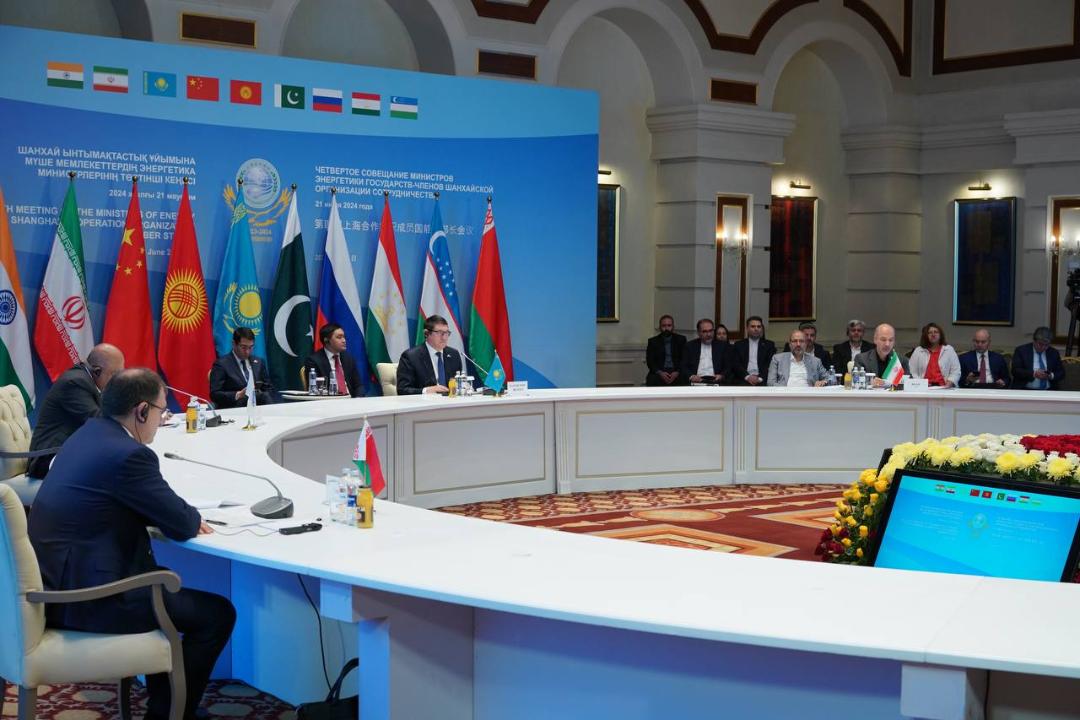This past week, the media paid attention to the 4th meeting of the Energy Ministers of the Shanghai Cooperation Organization and their approval of a joint Strategy for the Development of Energy Cooperation, Uzbekistan and Russia implementing several joint projects in the energy sector valued at approximately $22 billion, Kyrgyzstan’s Parliament passing the bill for the construction of the China-Kyrgyzstan-Uzbekistan railway unanimously, Russia’s exporting coal to India via the NSTC for the first time, and the upcoming CSTO exercises in Kazakhstan.

Energy Ministers of the Shanghai Cooperation Organization (SCO) meet in Astana. Source: GOV.KZ
Energy
On June 20-21, the fourth Meeting of Energy Ministers of the Shanghai Cooperation Organization (SCO) member states took place in Astana (Astana Times). A key outcome of the meeting was the approval of a “Strategy for Development of Energy Cooperation of the SCO Member States until 2030” (Economist.Kg). Initiated by President Kassym-Jomart Tokayev of Kazakhstan, the strategy outlines the primary areas of collaboration in the energy sector for the next seven years:
- Development of the transit potential of energy resources and diversification of export routes.
- Formation of a new energy system that balances industry development priorities.
- Modernization of traditional energy sources and systemic improvement of the industry.
- Advancement of innovative technologies and science in renewable energy sources and hydrogen energy.
- Exploration of solutions for energy saving and increasing energy efficiency.
In other news, it was reported this week that Uzbekistan and Russia are implementing several joint projects in the energy sector, with a total value of approximately $22 billion (Kun.Uz). It is also reported that Russia has increased its export of natural gas to Kyrgyzstan (Sputnik Kyrgyzstan). According to data from the National Statistics Committee, from January to April, the Kyrgyz Republic imported 238.2 million cubic meters of gas, all sourced from the Russian Federation. In comparison, during the same period in 2023, Kyrgyzstan received nearly 193 million cubic meters of gas: 172.7 million from Russia and 20.3 million from Uzbekistan. The reason for the cessation of supplies from Uzbekistan during this year has not been specified.
Transport & Connectivity
On Wednesday, June 19, 2024, during a parliamentary meeting in Kyrgyzstan, a bill for the construction of the China-Kyrgyzstan-Uzbekistan railway was considered and unanimously approved in three readings (Exclusive.Kz). Questioned about the financial details and provisions of the agreement between the three countries during a subsequent interview, Kyrgyzstan’s President Japarov emphasized that "the China-Kyrgyzstan-Uzbekistan railway construction project has no connection to external debt" (VB.Kg). President Japarov elaborated on the revenue distribution for the railway, noting that the Kyrgyzstani side will appoint the general director, while the other two parties will each appoint a deputy. Financially, he assured that all expenses will be managed collectively by the three countries until the railway is completed. China will contribute 51% of the funds, with Kyrgyzstan and Uzbekistan each providing 24.5%. Per the partnership agreement, once the initial investment is recouped, Uzbekistan and China will exit the project, and Kyrgyzstan will assume full ownership.
Elsewhere, it was reported that the first two trains carrying coal have begun their journey from Russia to India, transiting through Kazakhstan, Turkmenistan, and Iran (Rail News Kazakhstan). The trains are traveling along the eastern branch of the North-South Transport Corridor (NSTC). After crossing the Sarakhs border on the Turkmenistan-Iran border, the coal cargo will proceed to the port of Bandar Abbas on the Persian Gulf, from where it will be shipped to India. In early May, it was reported that multimodal "AgroExpress" trains were sent for the first time from the Yuzhnouralsky Transport and Logistics Complex in Chelyabinsk, Russia, to Mundra Port in Chennai, India, via the same route, with a travel time of about 35 days.
Security
Preparations are underway for the CSTO exercises in Kazakhstan (Asia Today). The country is actively preparing for the command post exercises “Indestructible Brotherhood-2024” and “Skala(Rock)-2024,” scheduled for this fall. Deputy Prime Minister and Minister of Foreign Affairs of Kazakhstan, Murat Nurtleu, announced this at a meeting of the CSTO Council of Foreign Ministers. He highlighted that joint activities are proceeding as planned to enhance the operational and combat readiness of CSTO forces. Nurtleu also noted the ongoing effectiveness of the CSTO's joint operations, which target terrorism, extremism, drug trafficking, and cybercrime. As the current chair of the CSTO, ‘Kazakhstan will continue to promote balanced development across all areas of cooperation’, Nurtleu emphasized.

